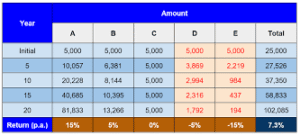Regardless of whether you are in Malaysia or anywhere else in the world, financial planning, especially saving and investing, is crucial for you to beat inflation or to achieve your financial goal, such as to have a comfortable retirement. You may have heard of people who lost their fortune during the 1997 Asian Financial Crisis or the 2007 Global Financial Crisis. However, when done right, investing can make an average person a millionaire.
Investing can be a risky endeavour, but help is at hand from financial advisory professionals in Malaysia. Nevertheless, whether you wish to invest on your own or with the guidance of a financial adviser, do take some time to understand 3 “golden rules” everyone should know and practise in their investment journey:
1) Preserve your capital
“Rule No. 1: Never Lose Money. Rule No. 2: Never Forget Rule No. 1.” – Warren Buffett
This timeless quote from Warren Buffett, one of the most successful investors of all time, reminds us of the importance of preserving our investment capital.
The lesson here is not about avoiding the daily price volatility in the financial markets, but rather the need to guard against excessive losses, whether realised or unrealised. This is illustrated in the table below:

The left column of the table shows the percentage decline or losses from the original capital, while the right side shows the percentage of increase required to return to the original capital (breakeven) position after suffering the losses. As clearly illustrated in the table, a 10% loss would require a 11% gain to return to the original capital position, and a 25% loss would require a 33% gain to break even, so on and so forth.
Putting this into an example, if you have invested RM10,000 in your investment portfolio, and the portfolio suffered a 50% loss (which means the value has declined to RM5,000), the portfolio would then need to generate a return of 100% – in other words, double its value from RM5,000 to RM10,000 – in order to break even. Even then, the portfolio will only be back to its original position and will have not made any gains yet!
The key point here is that you win by not losing. That is why when we manage investments for our clients in Malaysia, we focus on the downside by not allowing excessive losses, and the upside will take care of itself.
2) Include Diversification as Part of Your Financial Planning Strategy
“Don’t put all your eggs in one basket”
Suppose you have RM25,000 to invest right now, but you are not sure of what investment to go into, therefore you take a very simplistic approach to invest RM5,000 into 5 different investments.
After 20 years, assume that the 5 investments will yield the following results:


We may mistakenly think that our investment would have remained the same because the +15% and +5% returns seem to have been canceled out by the -15% and -5% returns when we add them arithmetically.
Thankfully, this is not the case and the actual results are shown in the table below.

Your RM25,000 investment would have grown by more than 4 times to RM102,085 after 20 years, giving an annual return of 7.3%!
This shows that, with diversification, even if one or two of your investments didn’t do well, you have a high probability of getting a positive return. Diversification can reduce your downside risk.
3) Keep your eye on the prize
“Always remember your ‘Why’”
Before we start investing or planning our financial future in Malaysia, we must know why do we want to invest. We should have the end in mind. This could be a financial goal that we want to achieve, for example, to accumulate a RM5,000,000 retirement fund by age 60 or to raise RM500,000 for a child’s tertiary education in 15 years. The goal has to be specific and measurable.
If we do not set a financial goal, it is as if we are boarding a plane without any idea where the plane is going to land!
Your investment journey is unlikely going to be smooth sailing all the time. There will be setbacks, crises, mistakes, and disappointments. Most of these are actually beyond your control. Additionally, the financial markets are full of “noises” in the form of overwhelming, and at times conflicting, news, and opinions that may distract you from your investment objectives.
Hence, we must regularly review and monitor our investment plan. Make adjustments when necessary, to ensure that our investments are on track to realise our financial goals. If an investment is doing badly and the fundamentals have deteriorated, we may want to exit the investment and redeploy the capital to a better performing investment. If the overall plan seems to be falling short, then we may need to increase our savings to make up for the shortfall. On the other hand, if the investment is doing very well, we may want to lock in the gains early.
While investing has its risks, the bigger risk lies in not achieving your financial goals.
Financial planning and investing to achieve your financial objectives are not rocket science but doing them well would take time and effort. When investing, remember the three principles above and you would have established the right foundation for greater success. Alternatively, if you wish, you can engage an independent financial planning firm that provides investment planning as part of its financial advisory services.

